Have you ever encountered annoying sticky sap coating your car, furniture, or walkway? Did you find it under a tree? Say hello to honeydew.
Honeydew is a common plant health issue. It’s gross, it’s annoying, and it can be difficult to remove. But here’s the worst part of all: it attracts pests that can become detrimental to plants and can lead to the development of sooty mold.
In this article, we talk all about sooty mold, the unsightly consequences it leaves on your landscape, and what it really means when you find it on your trees.
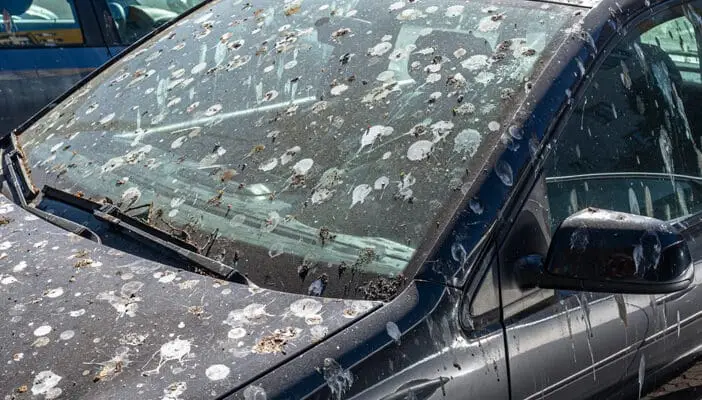
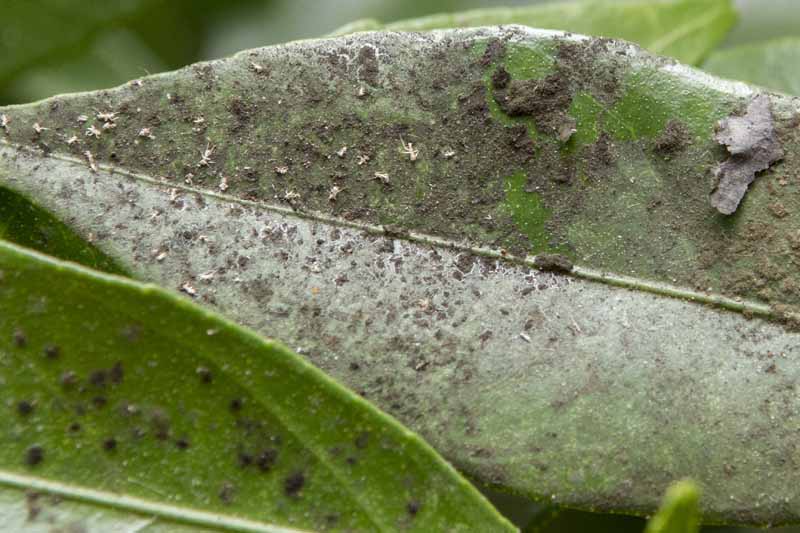
What is Sooty Mold?
A type of plant mold that results in an unsightly black discoloration on trees. Without proper control, it can make the host plant turn entirely black.
This tree mold grows on the honeydew residue left by sucking insects, such as aphids and soft scales, that infest the plant. These pests can cause the host plant to lose its ability to absorb enough sunlight. Consequently, the affected plant risks not producing the nutrients it needs to survive.
Causes?
With that said, can you guess what the real cause of concern is when it comes to sooty mold? That’s right – it isn’t the mold itself, but rather its indication that pests are infesting your landscape. If left untreated, these sap sucking insects will leave a detrimental aftermath on your plants.
Therefore, to save your tree, it’s best to act proactively; and, if your tree has already been affected, you’ll need to act immediately.
What insects cause black sooty mold?
- Lace bugs (targets: Azaleas, Rhododendrons, and other plants in the heath family)
- Scale insects (targets: Azaleas, Rhododendron, Huckleberry, Andromeda, Hawthorn, Poplar, Maple, Oak, Linden, Birch, & Willow)
- Aphids (targets: Ash, Crape Myrtles, Fir, Pine, Spruce, Cedar, Hackberry, Roses, and Tulip Poplars)
>> Read here to learn more about these tree bugs
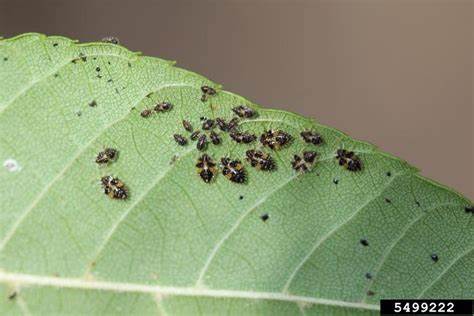
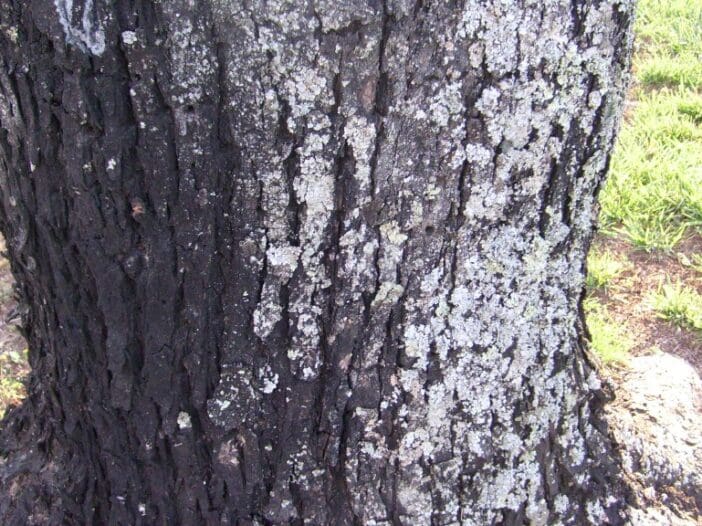
Sooty Mold Symptoms
Along with the obvious black discoloration, there are a few other symptoms you can look out for when trying to identify if your trees are dealing with sooty mold.
Symptoms include:
- Stunted plant growth
- Early leaf drop
- Tree bugs sucking up sap
- Honeydew residue
If you spot these symptoms in your plants, it’s important to reserve an appointment with your Certified Arborist to prevent further damage on your landscape.
Sooty Mold Treatment
Here’s the thing – when you spot sooty mold on your tree, the damage is already happening in your landscape. And that unsightly black mold? It isn’t coming off. The best way to act against it is to act proactively.
How to prevent sooty mold: Gain control against the insects that can overwinter on the host plant. A simple solution to this is having a preventative dormant oil spray applied to your plants.
By having the treatment applied before spring, you can prevent overwintering insects from wrecking havoc on your landscape. (And, in case you missed it, spring is right around the corner!)
Already see signs of the mold? Don’t worry – we can still treat the causal agent! With help from our tree experts, you can suppress the infestation and improve your plants’ health over time.
**Here’s a tip from one of our Certified Arborists: Do NOT power wash your affected plants, as it can actually do more damage to them.
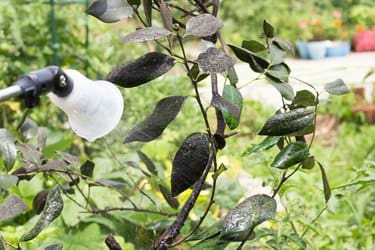

If you think you spot Sooty Mold, give us a call at 703.573.3029 or book an appointment and one of our Certified Arborists can evaluate your tree to see what the issue is and provide an all-natural solution.
Trustindex verifies that the original source of the review is Google. I connected with RTEC through a neighbor who was interviewing RTEC for tree work on her yard. Ben was very thorough looking at the trees that I thought needed work. He understood my desire to keep the trees healthy and reduce falling limbs. The price my small job seemed reasonable. The crew came on Friday for the contract I signed on Monday. I was able to speak with the crew leader and give him my perspective on the work needed before I had to leave for another engagement. When I returned, the work was done just as Ben and I had discussed and I discussed with Pedro. The yard was cleared of debris. I was pleased with the result and there was honestly nothing to criticize.Trustindex verifies that the original source of the review is Google. I have used RTEC Treecare both at my home and for a commercial job and I have been very happy with them. They are professional, knowledgable, and great to work with. Communication was a breeze! I highly recommend them!Trustindex verifies that the original source of the review is Google. RTEC treated my crape myrtles and saved them from disease. My yard looks great since I started using RTEC last year! They are so knowledgeable and helpful!Trustindex verifies that the original source of the review is Google. We had a large (4’) diameter maple tree at the end of our driveway (and neighbor’s driveway) that needed to come down. We worked with RTEC on a removal strategy that wouldn’t impact our neighbors. When we came home that evening the tree and the cleanup was so thorough I joked with my wife that “someone had stolen our tree!” RTEC is masterful in their work, true skilled professionals!Trustindex verifies that the original source of the review is Google. RTEC Tree has been taking care of our front Zelkova with biostimulant treatments for several years now. We had extensive front hard and landscape construction completed around the Zelkova, and the tree came through beautifully with no shock whatsoever. They recently pruned our Zelkova, and they preserved the shape of the tree. Upon pruning, they noticed a nest of 3 baby squirrels in the crook of two of the limbs. They respected that nest and notified me that they worked around the nest. Thank you, RTEC! They also removed 4 dead or suspect limbs from an oak tree adjoining our back yard. The limbs were hanging over our fence and house. They cleaned up all the debris after carefully lowering the limbs without damage to our patio furniture and grill. They respect the existing new landscaping. RTEC has also removed diseased trees from our property over the years, including an oak tree from the Resource Protection Area (which was not on our property). They worked with Fairfax County to file all paperwork to remove the tree which posed a hazard to the surrounding homes including ours. RTEC has all the equipment to deal with any tree problem and their crews are pleasant to interact with. Ben Gotch has been our consultant and he is tuned into the homeowner. Very detail oriented and thorough. He kept us apprised of our service especially if scheduling modifications needed to be made. RTEC arrived on time and finished the jobs in an efficient manner, cleaning up all the debris. I very highly recommend RTEC for all your tree needs.Trustindex verifies that the original source of the review is Google. I love RTEC. Ben is especially great. He's the only tree guy who has ever told me not to do tree work, which to me shows honesty compared to the other guys, whose only solution is always to cut the tree down.Trustindex verifies that the original source of the review is Google. Excellent service!Trustindex verifies that the original source of the review is Google. We've been using RTEC Treecare for about 5 years for pruning, tree removal, and the Bio-stimulant Program for our old maple tree that keeps the house cool in the summer. We really like that they have knowledgeable arborists on staff and know what they're doing.Trustindex verifies that the original source of the review is Google. Have been using for many years. professional and detailed in treatments and pruning.Trustindex verifies that the original source of the review is Google. We have used RTEC Treecare for over 10 years and have really appreciated their attention to keeping our trees and shrubs in good health. We have a number large trees that have needed various treatments and have been pleased to be able to maintain them in a healthy and attractive condition. I highly recommend them and their arborist Ben Gotch.Google rating score: 4.9 of 5, based on 245 reviews
